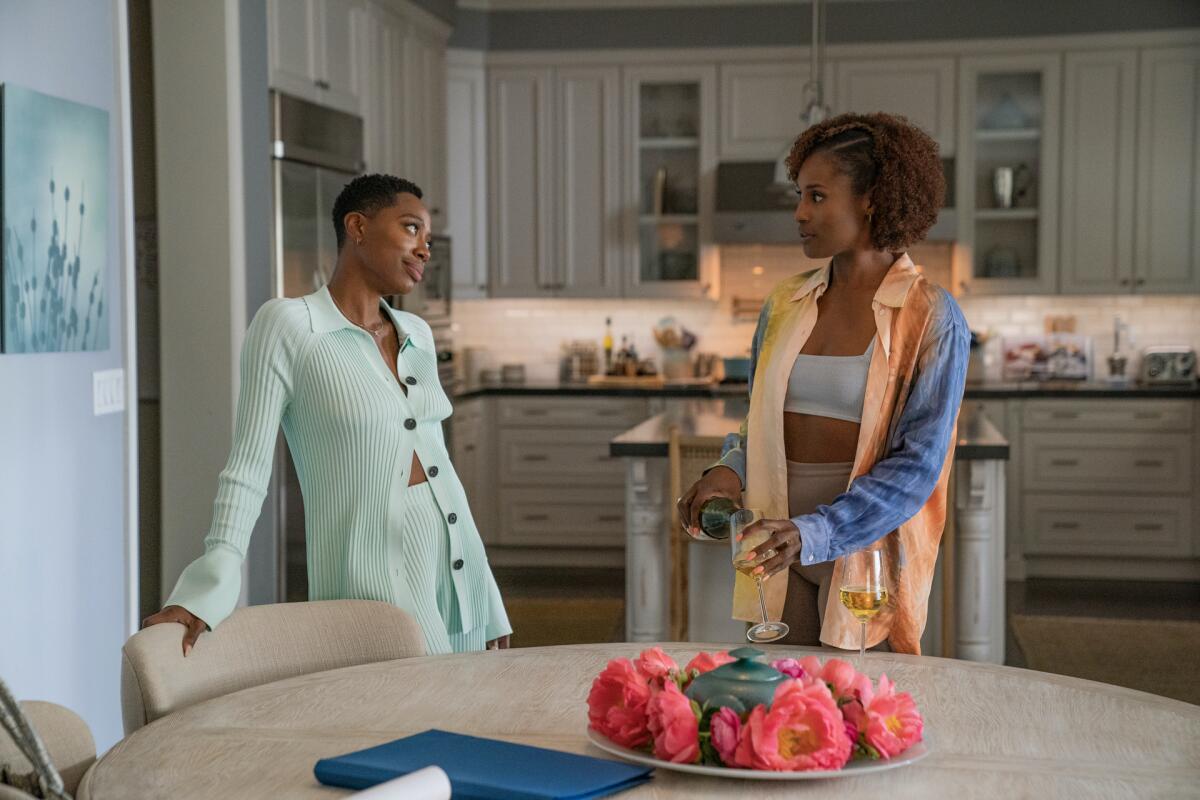How ‘Insecure’ opened doors, hearts and minds before saying goodbye

When HBO’s beloved comedy series “Insecure” wrapped its fifth and final season in December, showrunner Prentice Penny had a hard time letting go. “It was like graduating high school,” he says. “It’s not like I’m never going to see them again, but we won’t be seeing each other every day. That was one of the hardest parts of saying goodbye.”
Fans felt the same way about leaving “Insecure” and the characters they’d become so invested in since first meeting them when the series premiered in 2016. Co-created by Issa Rae and Larry Wilmore, the show immersed viewers in a Black female experience from the perspective of close friends Issa (Rae) and Molly (Yvonne Orji). They’d been tight since their days at Stanford, but now, headed into their 30s, they were facing new challenges around career, love and their own sisterhood. Characters evolved from season to season while the show, set in South Los Angeles, ushered in a new, more diverse era for television.
When asked what “Insecure” uniquely gave to viewers along the way, Rae says: “Visibility. In front of the camera and behind. And comfort.”
Penny, who wrote and produced on the series “Brooklyn Nine-Nine,” “The Hustle” and “Scrubs,” recalls having two very clear objectives when they launched the show. “Our first goal was to always be unapologetically honest and unapologetically Black,” he says. “There’s no guarantee you’ll get the show past one season, right? So if we’re gonna get canceled, we’re not gonna get canceled because we played it safe. The other goal was that while we’re here and we have a platform, we’re going to open the door for opportunities for as many people of color and women as possible…. We just were like, ‘Hey, if we can do those two things and we only get one season, then, hey, we made it better for somebody else.’”
“Insecure” did just that. Debuting the year after “black-ish” knocked down barriers, it offered a fresh take on single life among Black women with nuanced, indelible characters. Fans connected with Rae’s awkward, self-conscious character Issa, who had foggy life ambitions, a wicked sense of style and always seemed to say the wrong thing at the wrong time. She relied heavily on the advice of her bestie, Molly, a confident, hyper-focused, prosperous attorney whose love life was anything but a success.
“I just wanted to create a show that Black people, and Black women specifically, could relate to,” says Rae, who gained notoriety earlier in the decade with her web series “The Misadventures of Awkward Black Girl.” I wanted a cool and updated representation of the ‘90s shows that I love but with flawed leads I had never seen in this way before.”
At the crux of “Insecure” was the bond between Issa and Molly. Their tight network included Lawrence (Jay Ellis), Frieda (Lisa Joyce), Kelli (Natasha Rothwell) and Tiffany (Amanda Seales), but each season was built around the ups and downs of their mercurial relationship.
“Our starting place was always, no matter what, that Issa and Molly love each other,” says Penny. “It’s different than ‘Girls,’ where the girls can be frenemies. We didn’t want that energy, and we certainly didn’t want that energy for Black women, especially when you see reality shows where Black women are going at each other. It’s like family: If there’s love in there, you can go through times with them when you’re not speaking, when you’re mad at them. You can say things that are hurtful. You may not always like them, but you love them. And at the end of the day, you always want what’s best for them, no matter what.”
Los Angeles also played a huge role in the series. Rae and Penny grew up in South L.A., a part of the city that doesn’t get much love onscreen, so they made it a point to explore the culture and nuance of their neighborhood through the escapades of the show’s protagonists.
“Issa, Melina [Matsoukas, director] and I always wanted L.A. to be a character, the same way when you watch a Spike Lee movie you feel New York. Or a Woody Allen movie,” Penny says. “We’d never seen that part of L.A. portrayed that way for us. Obviously, HBO had “Entourage,” so you had Hollywood and Malibu, very specific to what everybody knows about L.A. Or you have another kind of L.A. that’s violent. But we were like, you never see this slice of L.A. where there’s aspiration, great restaurants, great culture, great people, beautiful homes, wonderful landscapes. There’s beauty south of the 10 Freeway. We wanted to make that area feel cinematic. So we made a love letter to our part of L.A., the areas we grew up in.”
What will Rae miss most about “Insecure”? “Without a doubt, [I will] miss the people and that inexplicable feeling of creating something new with people who have something to prove for the first time,” she says. “It will forever be the blueprint for my future experiences in this industry.”
More to Read
From the Oscars to the Emmys.
Get the Envelope newsletter for exclusive awards season coverage, behind-the-scenes stories from the Envelope podcast and columnist Glenn Whipp’s must-read analysis.
You may occasionally receive promotional content from the Los Angeles Times.










